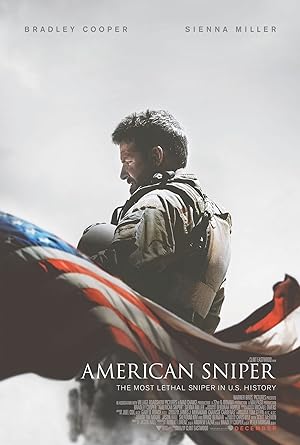If someone told me that Angelina Jolie directed American Sniper, I would not have been surprised because it felt derivative of a lot of recently made war movies that unfold in Iraq, but also past classic war stories like Enemy at the Gates. Because I watch too many movies and studied about WWII, it is not uncommon to forgo a portrait of an individual at war against anonymous opposing masses in exchange for a more manageable conflict between two polar opposites. In American Sniper, Chris Kyle, the sheep dog, faces off against Mustafa, the wolf. Even without reading Kyle’s autobiography, I could immediately discern that the narrative technique was one put forward by a savvy media type, not the actual Chris Kyle.
Indeed American Sniper uses many of the same narrative devices that Jolie’s Unbroken did. American Sniper starts with Kyle’s first day of action in Iraq then flashes back to Kyle’s childhood until we return to the opening scene and progress to his subsequent tours in Iraq until he returns home. Unlike Unbroken, I think that this narrative device was more successful in American Sniper, particularly the scene in the church where Kyle listens to a sermon and steals a Bible from the pew that he carries around unopened and unread the rest of his life based on the script.
This framing is crucial for American Sniper unlike Unbroken. American Sniper equates God’s overall judgment/vision of unfolding, confusing human events and Kyle’s unerring vision as he always correctly discerns who should be shot. His purpose in life is to stop his evil counterpart, who even wears black. Though the concept of a man’s vision being as unerring as God’s is disturbing, it works in terms of being sympathetic with Kyle. Unfortunately Kyle as the unerring hand of God is less interesting than Kyle as a son weighted down by gender norm responsibilities to protect his brother. This responsibility translates into an ultimately fatal burden as he gets older and the definition of brother expands exponentially and rarely, but nearly disastrously for one playful dog.
I’m surprised that Clint Eastwood made American Sniper until the final scenes where Chris Kyle returns home for good, which echoed the ambiguities of surviving war as illustrated in Flags of Our Fathers. I’m not saying that American Sniper should have been sympathetic to Iraqi opposition or portrayed them as anything but villains considering that it is likely that Kyle saw them that way, and American Sniper IS Kyle’s story, but in light of Eastwood’s past work, I’m surprised that Eastwood portrays Kyle’s enemies as one-dimensional bad guys unlike his recent ambitious classic, Letters from Iwo Jima. In Flags of Our Fathers, Letters from Iwo Jima and The Changeling, Eastwood usually finds a way to challenge the cover story provided by the possibly hypocritical authority to imbue historical characters with the urgency and personal depth of people living daily life instead of noble characters acting as if they lived life in sepia-toned hues. Instead he sacrifices Kyle’s personal story to validate the authority’s story that Kyle was fighting the right bad guys. I would expect such a portrayal from Jolie, not Eastwood. If Eastwood really believes that the war in Iraq was justified, it is his movie, but it is a departure from his recent work. If Eastwood could sympathize with Japanese soldiers who tortured our prisoners of war in WWII, a just war if there ever was one, I’m surprised that he did not give a little nuance to the the second Iraq war which was weighted with authority hypocrisy and had US fighting the wrong war instead of going against the author of 9/11, Bin Laden himself.
I wish that Kathryn Bigelow of the masterpiece Zero Dark Thirty could have adapted Kyle’s life story. American Sniper felt simultaneously too slow and too rushed, needed to feel more personal and urgent instead of iconic and predictable. American Sniper is only a must see if you’re interested in the subject matter.
Special shout out goes to Sienna Miller, who decided that British blonds may have more fun, but American brunettes get more money as wives to murdered famous men in both American Sniper and Foxcatcher. Get money!
Stay In The Know
Join my mailing list to get updates about recent reviews, upcoming speaking engagements, and film news.




